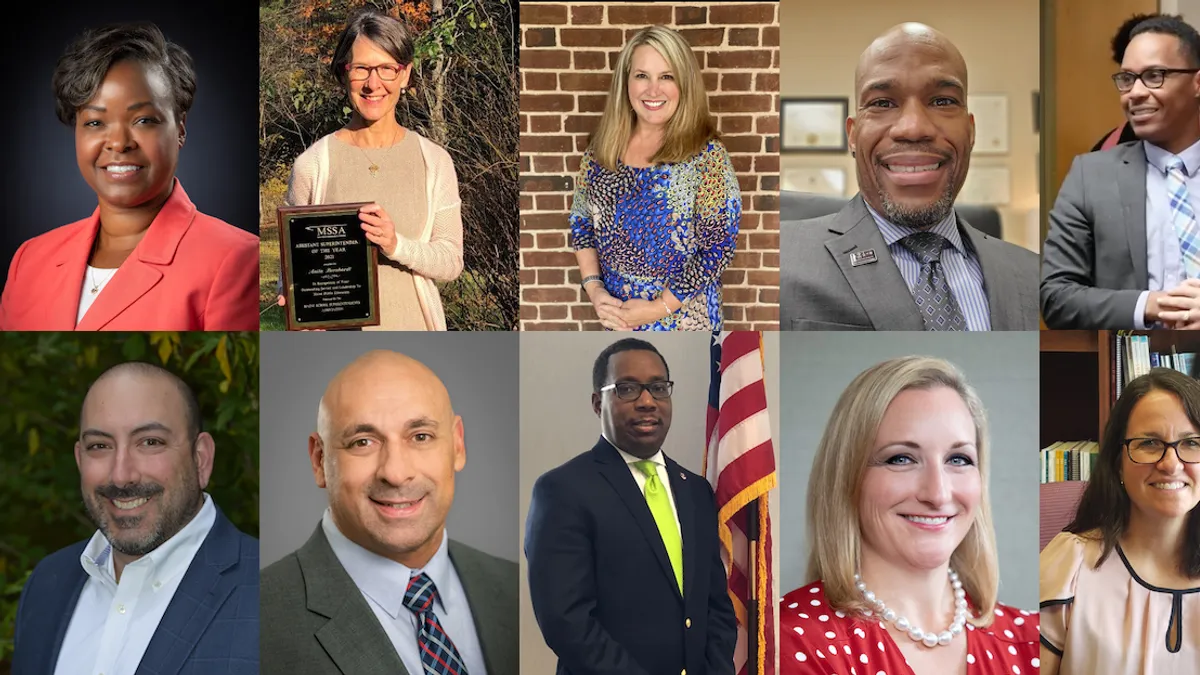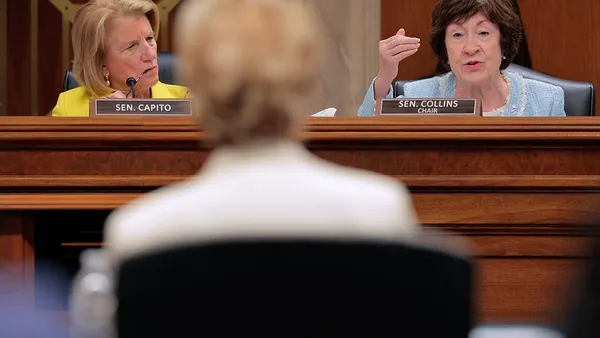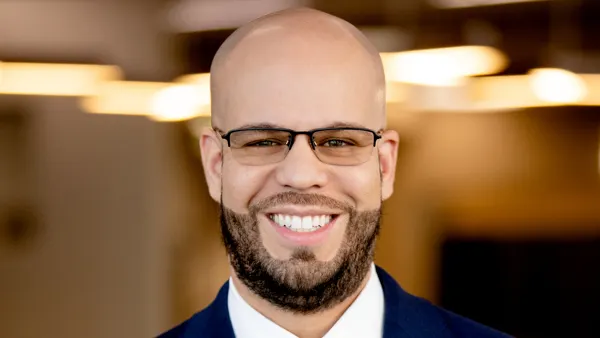Recent years have seen a breaking of silos between departments in school district central offices as an influx of new tools, evolving learning models and other factors necessitate greater cooperation.
As overlap and distribution of leadership grow among assistant superintendents and other cabinet-level positions overseeing areas like instruction, technology and student services, these roles have become arguably more critical to district success than ever.
From leaders rethinking assessment and expanding the breadth of curricula to those striving to improve approaches to culture and discipline, these are our inaugural Rising District Leaders.
Nkenge Bergan
Director of student services at Kalamazoo Public Schools in Michigan
As the director of student services at Kalamazoo Public Schools for the past five years, Nkenge Bergan serves 13,000 students and their families by ensuring their learning experiences are safe, nurturing and engaging. She supervises and motivates a team of administrators, culture climate coaches, campus safety officers, behavior specialists and nurses to use intentional and innovative approaches to support students and families.
Her work contributes to the district’s efforts to help every student succeed. The district’s Kalamazoo Promise scholarship program provides up to 100% post-secondary tuition and fee assistance for every Kalamazoo Public Schools graduate meeting attendance and residency requirements.
Bergan, a former general and special education teacher, has worked to reduce long-term removals such as expulsions and exclusions within the district, instead focusing the district’s efforts on finding the root causes of behavioral issues rather than simply resorting to discipline measures.
She also has led district efforts to implement culturally responsive education and oversaw the growth and development of social-emotional learning in the district during the COVID-19 lockdown. To better support community wellbeing, she helped the district win a $1 million grant to create the Social Emotional Learning Professional Development Center, which will provide SEL resources and coaching to the staff and community members in the future.
Additionally, Bergan, who worked closely with campus safety staff to ensure the district’s 26 buildings are safe, was also a key leader for district COVID-19 protocols, testing and vaccinations.
Back to topAnita Bernhardt
Assistant superintendent of schools at York School Department in Maine
Recognized for her data-driven and collaborative leadership in improving academic performance, attendance and graduation rates, Anita Bernhardt was named Maine’s 2021 Assistant Superintendent of the Year in October 2020 by the Maine School Superintendents Association.
The district ranks in the top 10% of the state’s public schools, with its average math proficiency score of 55% and reading proficiency score of 76% both well above the state averages of 36% and 56%, respectively.
In her efforts to meet the needs of York’s students, she is credited with leading assessment teams to focus on fact-based, informed approaches to designing creative learning solutions, in addition to ensuring professional development is timely and challenging. Her work on PD has even expanded to include neighboring districts.
A former science teacher, her other professional accolades have included the U.S. Presidential Award for Excellence in Teaching Science in 2003 and the Maine Audubon Educator of the Year in 2009.
Back to topZabrina Cannady
Assistant superintendent for student services at Houston County School District in Georgia
Zabrina Cannady is beginning her 28th year in education, with 10 years spent supporting students with emotional and behavioral disorders, as well as mild cognitive and learning disabilities. Cannady currently serves as assistant superintendent for student services in Georgia's Houston County School District, which serves over 30,000 students.
Cannady’s efforts have led to several district programs that support the well-being of students, including working closely with the Department of Behavioral Health and Developmental Disabilities to offer mental health services through the Georgia Apex Program. In October 2020, Houston County was chosen as one of three districts in the state to be awarded the Project AWARE grant through the Substance Abuse and Mental Health Services Administration. This five-year, $2 million grant will help the district promote the mental health well-being of students while preventing youth violence.
In 2018, Cannady worked with the district’s community relations department to create and produce "13 Reasons Why Not," a video series that featured 13 courageous teens and adults who shared their personal tales of adversity and hope. "13 Reasons Why Not" gained state and national attention, winning awards at the state level, as well as the 2019 Golden Achievement Award from the National School Public Relations Association.
Cannady expanded opportunities for students through the opening of the Houston County Transition Academy. The Transition Academy serves students who have met high school graduation requirements, but continue to be eligible for special education services. The goal is to provide real-world opportunities that address independent daily living and self-care skills, social and behavioral skills, communication, motor skills. academic skills, and work-readiness.
Cannady also currently serves as treasurer of the Council of Administrators of Special Education, and is the president-elect for the Georgia Association of Educational Leaders.
Back to topPatrick Hardy
Executive director for equity and student success at Oak Park and River Forest District 200 in Illinois
When a brawl of over 300 people, some students from Illinois’ Provisio East High School, broke out in 2013, the school district responded that the school year ended “without incident” and that “situations do happen in the community that involve our students, and while we are always concerned, it is not something over which we have any jurisdiction nor control."
But when Hardy joined Provisio East as its principal in 2015, he seemed to disagree. He grabbed his assistant principal and took it upon himself to prevent fights originating at the gas station outside the school. “I needed my kids to get home safe every day,” he told a local paper.
“We were going to reclaim that gas station as part of Proviso East.” At times, he even drove around his neighborhood to remind students who were missing class to go to school and told the local restaurants to stop serving students during morning hours when they were supposed to be in class.
His efforts resulted in more than an 80% decrease in the number of incidents resulting in out-of-school suspension, an increase of the graduation rate by 16% since 2016, and a 92% postsecondary placement for 3 years.
Hardy now begins his work as the new executive director for equity and student success at Oak Park and River Forest School District in Illinois. “The focus of my work is reducing and ultimately eliminating the current predictability of student outcomes based on race,” he told K-12 Dive in an email.
Back to topTerry Harris
Executive director of student services at Rockwood School District in Missouri
One of the few Black leaders in Rockwood School District in Missouri, Terry Harris, alongside a number of his fellow Black colleagues, received threats from parents for being “the most racist guy towards white people you’ll ever meet” and who said he “has to be the one that goes first.”
Amid threats to his safety for pushing a more diverse and equitable curriculum as the executive director of student services, and in a situation where it would be completely understandable for anyone to take a step back, Harris pushed on — having to alter his schedule out of precaution and facilitate a security guard offered by the district. Harris even invited disgruntled parents to speak with him over the phone or in-person about his diversity initiatives, according to reports from TIME and NBC News.
“Critical race theory is going to go away, but you know something is going to replace critical race theory, and whatever does replace it is going to be race-related,” Harris, whose district does not teach the theory, which is often taught to graduate (not K-12) students, said. “You get to a point where you are not afraid anymore.”
Harris’ work focuses on uplifting and ensuring the well-being of students, including African American students specifically. Part of that work, he recognizes, is making sure the adults are also well. As a result, he co-founded The Collective STL, a nonprofit dedicated to bringing free yoga and wellness programs to African American communities in St. Louis. He has also created yoga spaces for children.
Back to topMatthew X. Joseph
Director of curriculum, instruction and assessment at Leicester Public Schools in Massachusetts
What does it mean to build a “transformational” school? It’s a question top-of-mind for Matthew X. Joseph, and one he has often presented to attendees at various education conferences. But rather than further contribute to the buzzword soup that fills the thought spaces at those events, Joseph provides a practical roadmap that outlines best practices and pathways to success, showcasing the thought leadership he brings to Leicester Public Schools.
Drawing from his current role and previous stints as an elementary school principal, classroom teacher and district professional development specialist, he often recommends beginning with a self-assessment of where the school stands so leaders can set a vision and tone for a shift, based on current research and the learning tools available.
Additionally, he focuses on the value of leading with positivity, instructional leadership, and the value of peer mentorship models to build buy-in on new approaches.
Joseph is also the author of “Power of Connections: Connecting Educators, Cultivating Professional Learning Networks, & Redefining Educator Collaboration” and “Power of Us: Creating Collaborative Schools,” and co-author of “Modern Mentor: Reimagining Mentorship in Education.”
Back to topAnthony Mignella
Assistant superintendent for instruction at Baldwin Union Free School District in New York
A former principal with more than 23 years of overall experience as an educator, Anthony Mignella works closely with Superintendent Shari Camhi to co-lead the implementation of innovative and equitable curriculum and programming with an eye toward engaging students and educators alike.
Among his accolades, the district credits him with helping to raise its graduation rate to 97% since becoming assistant superintendent in 2016, in addition to helping it rank among U.S. News & World Report’s top high schools for the last two years. At the elementary and middle school levels, his accomplishments also include improving math and science curriculum introducing an interdisciplinary STEAM program, and launching algebra for all at the 8th-grade level.
He also initiated “Better World Day,” in which 7th- and 8th-graders participate in a year-long, interdisciplinary civics research expedition to understand a local/regional/world problem and enhance their critical thinking, problem-solving and teamwork skills.
As the head of the district’s instructional technology program, Mignella has undertaken efforts to improve internal operations and was critical to ensuring teachers and students could fully participate in remote learning. He also oversees professional development initiatives including a New Teachers Cohort Program, an administrative retreat, and monthly professional learning sessions.
Back to topThomas Rogers
Assistant superintendent of Shelby County Innovation Zone Schools in Tennessee
Rogers has been the assistant superintendent of the Innovation Zone in Shelby County Schools for the past three years and has helped lead turnaround efforts for the district's lowest-performing schools. Under his leadership, he rebranded and restructured IZone with purposeful colors, logo and vision aligned with an expectation for excellence and a strong sense of urgency.
Through his focused lens, he strategically partners with vendors to build the capacity of school leaders, teachers and his centralized support team.
Known for his compassionate leadership style, Rogers makes all decisions through the lens of what is best for children. He knows personally how education can positively change the trajectory of a child’s life. Most recently, he sought outside funding and was awarded $14.4 million in services, training and student devices for every middle school child and teacher in IZone through a Verizon Innovative Learning Grant.
Since the inception of the IZone Schools in 2012, all of the Shelby County Schools that participate have made positive gains with more than two-thirds of the schools having double-digit gains, according to the IZone website.
But during the pandemic, the IZone schools have seen learning losses in all content areas. During a recent Summer Learning Institute, Rogers motivated school staff to recommit to the mission of maximizing the amount of growth for each student. At the end of the meeting, all of the attendees formed a large human “I” to represent IZone 2.0.
Back to topAmelia Ruzicka
Assistant superintendent at Bayless School District in Missouri
Ruzicka’s nearly two decades of teaching experience inspired her to help create Bayless School District’s first formal K-12 teacher leadership program when she became an assistant superintendent a few years ago. The program allows teachers to serve as change agents in the school system alongside Ruzicka’s role as a curriculum, instruction and assessment leader, helping to develop and support the vision and structure of a shared leadership model.
This effort began in 2018, when Ruzicka presented a proposal to the local board of education for the district’s first Teacher Leadership Academy. The 18 teacher leaders, who are also known as curriculum chairs, are from all K-12 grade levels, content areas, and special service areas. They serve as content area leaders in curriculum, instruction and assessment, and also facilitate effective communication within departments.
The primary objective of the program is to create a purposeful and professional learning community that combines each individual’s strengths to collectively and skillfully utilize data; employ research-based instructional practices; and establish rigor, relevance and relationships to support the cognitive, social and emotional development of every child.
The hope is that this program that empowers teachers will be scalable to the classroom setting to motivate students to create and realize a vision; communicate for success; and develop as leaders.
Ruzicka and the team of teacher leaders have traveled across the country to share their experience at meetings of the Teach to Lead Summits, Elevating and Celebrating Effective Teaching and Teachers, and the National Network of State Teachers of the Year’s Adult Learning and Leadership Academy.
During her 20 years in Education, Ruzicka has received several awards for teaching excellence, including Missouri Teacher of the Year Finalist, Loeb Prize for Excellence in Teaching Mathematics, and Missouri Outstanding Beginning Teacher.
Back to topRebecca Toetz
Director of Instruction at DeForest Area School District in Wisconsin
Like many other district administrators, much of Rebecca Toetz’s work over the past 18 months has revolved around helping her district serve its local school community as best as possible through the COVID-19 pandemic. The DeForest Area School District’s approach particularly relied upon teacher leadership in the creation of learning plans, virtual learning professional development, and continued supports throughout the most recent school year.
Before COVID-19, Toetz recognized the need to balance whole-group professional learning with providing teacher choice in more personalized PD aligned with district strategic goals. In that sense, the success of teacher leadership during the pandemic can be seen as an achievement on that front.
Also prior to the pandemic’s start, Toetz’s work involved a focus on improving representation and cultural inclusivity in curriculum, she told K-12 Dive in April 2020, noting that one aspect of this was to make sure students are provided a broader portrait of Black history beyond slavery and persecution. The effort is made all the more essential as the district becomes more diverse, and is timely in light of the nation’s reckoning with systemic racism, a dual crisis that ran parallel to the pandemic.
Back to top











